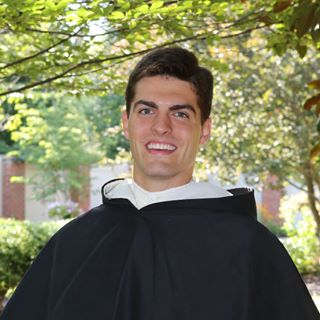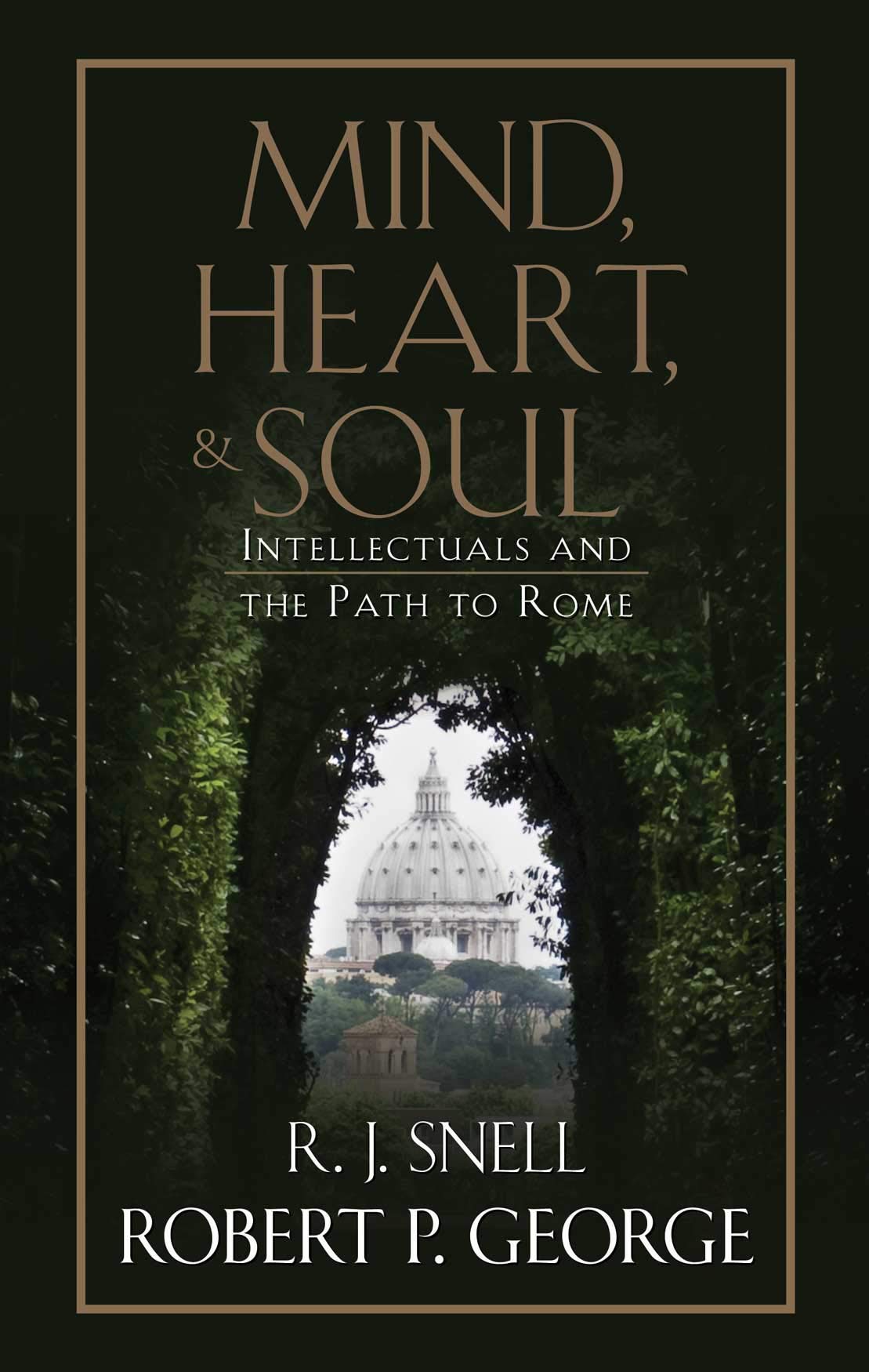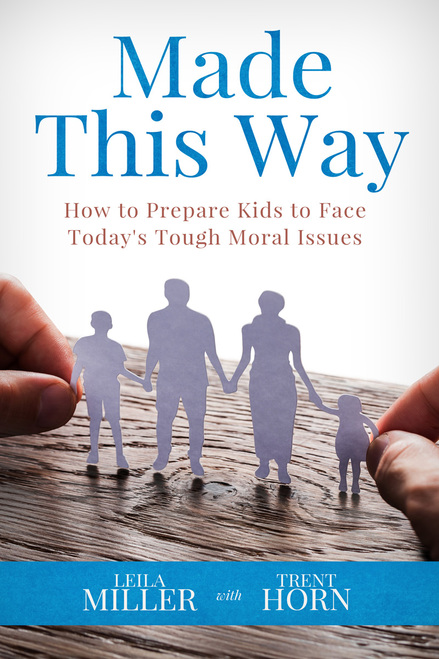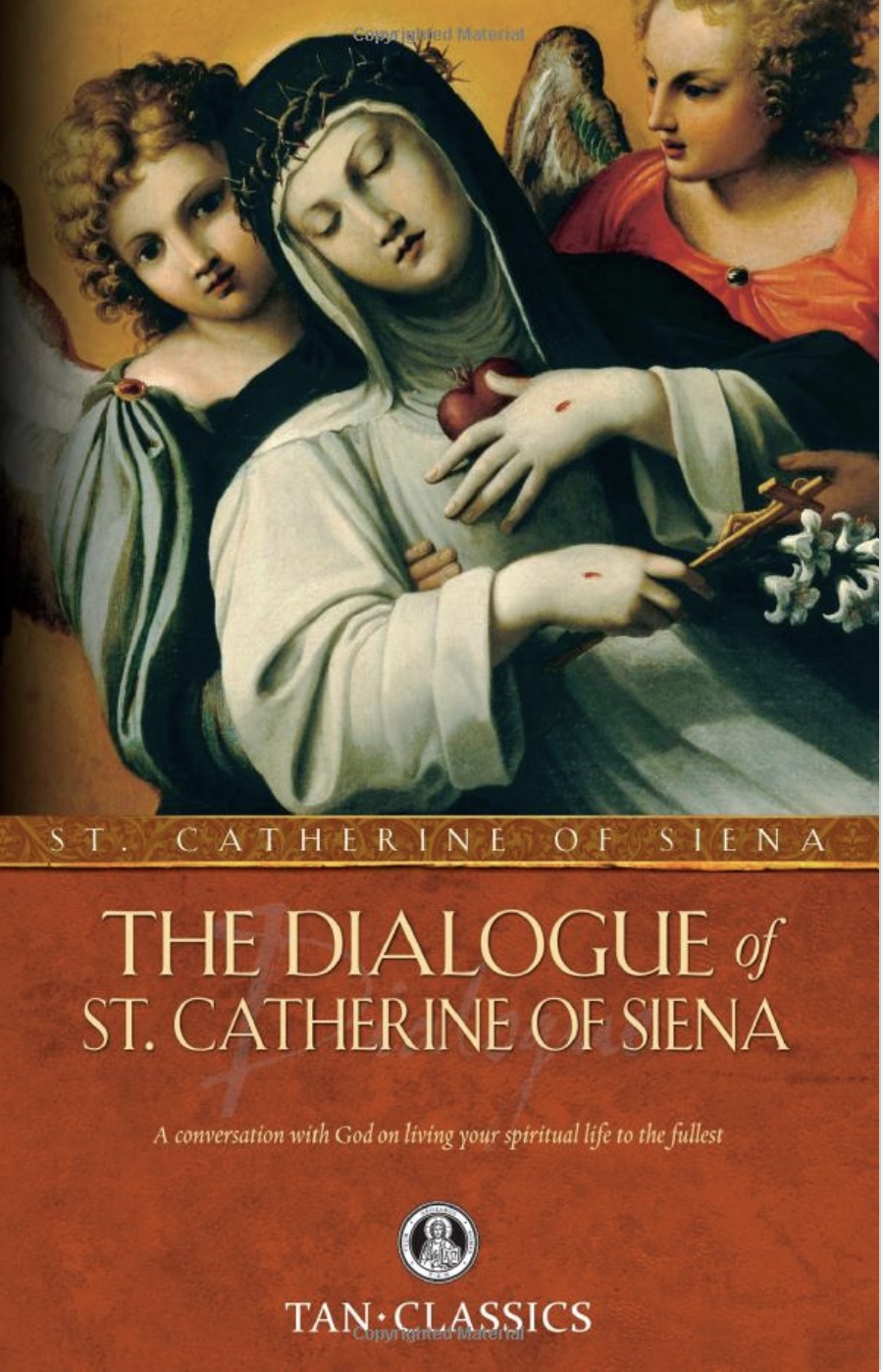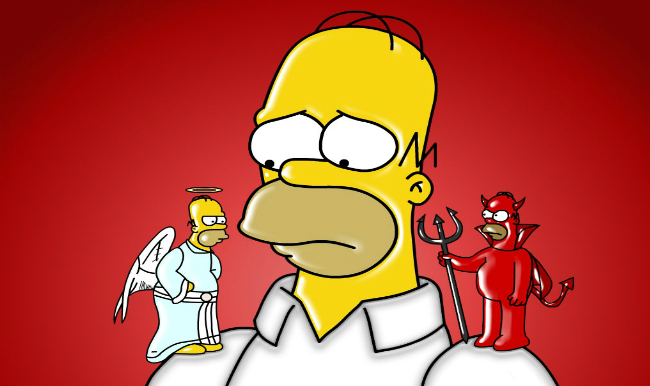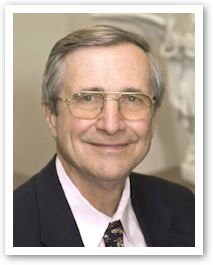
If you are not familiar with philosophy, as I am not, some things said, some “arguments”, in the pleasant, logical sense, can be difficult to understand, since we do not possess the basic premise, language, or vocabulary from whence the final definition we are handed comes from. It may be difficulty to understand:

if we have not been trained from the beginning of mathematical training. In the same way with philosophical and theological “arguments”, it is likely the novice, especially literal ones :), will be lost very quickly in what is meant.
Ancient, at least Greek, philosophers were trying to understanding the world. They sought immutable truths, even in an ever mutable reality. One of the ways they described this knowledge to which they obtained was Plato’s “Theory of Forms”. A tree has “treeness”. A rock has “rockness”. Even though there are a myriad of different things by which we call “tree” or “rock” there is an immutable reality known as “tree” or “rock” which exists outside of these ever changing realities, by which we know their particular instantiations. This area of philosophy is called “ontology”, or the study of being. What does it mean to “be”? It’s quite logical and makes much sense if you follow the bouncing ball in its “ballness”. [Couldn’t help myself! 🙂]
Aristotle was a student of Plato, and a friend. But, famously said he was more a friend of the truth, and so disagreed that the nature of a thing is abstracted from the thing. A rock has “rockness”, a tree has “treeness”, says Aristotle. There is not an abstracted sense of being, but of being itself. The nature of the thing cannot exist without the thing itself. Whereas Plato believed the concept of “treeness” or “blueness” existed outside human beings as an abstract reality, Aristotle believed the abstract reality existed in the human mind and not independent of physical reality, or the human mind. Plato said forms are extrinsic to things. Aristotle said forms are intrinsic to things. Aristotle said you cannot have the form without the thing. Plato said you could have the form without the thing.
Substance & Accident – Aristotelian Logic
Aristotle made the distinction between thing and quality of a thing. For instance, a dog is a dog, its substance. A dog may be black or brown, its accidents. Substance is the thing. Accidents are the qualities of things.
Substance and Accidents
Accidents are the modifications that substance undergoes, but that do not change the kind of thing that each substance is. Accidents only exist when they are the accidents of some substance. Examples are colors, weight, motion. For Aristotle there are 10 categories into which things naturally fall. They are
Substance, and
Nine Accidents:
- Quantity,
- Quality,
- Relation,
- Action,
- Passion,
- Time,
- Place,
- Disposition (the arrangement of parts), and
- Rainment (whether a thing is dressed or armed, etc.)
As Fr Dwight Longnecker, a convert from Anglicanism, explains in a a helpful manner, the consecrated Eucharist for Catholics is neither a symbol nor literal flesh and blood, and neither has ever been the teaching of the Catholic Church, although to explain the distinction, less than articulate explanations have been given when you don’t know calculus.
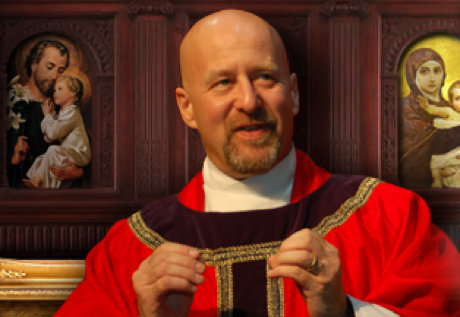
–Rev Dwight Longenecker, Fr. Dwight Longenecker is an American who has spent most of his life living and working in England.
Fr Longenecker was brought up in an Evangelical Protestant home in Pennsylvania. After graduating from the Fundamentalist Protestant Bob Jones University with a degree in Speech and English, he went to study theology at Oxford University. He was eventually ordained as an Anglican priest and served as a curate, a school chaplain in Cambridge and a country parson on the Isle of Wight. Realizing that he and the Anglican Church were on divergent paths, in 1995 Fr. Dwight and his family were received into the Catholic Church. In December 2006 he was ordained as a Catholic priest under the special pastoral provision for married former Anglican clergy. He now serves as parish priest of Our Lady of the Rosary parish in Greenville, SC.
“Neither position (symbolism nor literality) is the teaching of the Catholic Church. We believe in transubstantiation. The substance of the bread and wine really are transformed into the Body, Blood Soul and Divinity of Our Lord Jesus Christ. However, the transformation is not physical in a literal way. If you took the consecrated host to a laboratory it would be chemically shown to be bread, not human flesh.
The Catechism of the Catholic Church (CCC) teaches:
1375 It is by the conversion of the bread and wine into Christ’s body and blood that Christ becomes present in this sacrament.
1376 The Council of Trent summarizes the Catholic faith by declaring: “Because Christ our Redeemer said that it was truly His body that He was offering under the species of bread, it has always been the conviction of the Church of God, and this holy Council now declares again, that by the consecration of the bread and wine there takes place a change of the whole substance of the bread into the substance of the body of Christ our Lord and of the whole substance of the wine into the substance of His blood. This change the holy Catholic Church has fittingly and properly called transubstantiation.
It is therefore not possible for a Catholic to believe that the transaction at Mass is merely a symbolic memorial. But many people who believe in the Eucharistic transformation do not understand transubstantiation.
The word “transubstantiation” means “substance across” and to understand what this means we must first understand what the medieval philosophers like St Thomas Aquinas meant by the word “substance”. They meant by this word almost exactly the opposite of what we mean by it. When we say something is “substantial” we mean it is solid, real, physical and concrete. The medieval philosophers however, used the word “substance” to indicate the invisible and eternal quality of a thing. The physical aspect of a chair, for example, is temporary and mutable. It changes. Eventually, given enough time, the wood of the chair will break, rot and decay into dust. The “chair-ness” of the chair is the eternal, invisible part and this is what is referred to as the “substance.”
With bread and wine the “breadness” of the bread and the “wine-ness” of the wine is the substance and it is this “substance” which is transformed. The physical part of the bread and wine is called the “accident” and the accident of bread and wine remain although the substance of the bread and wine have become the Body and Blood of Christ.
We can think of it like this: I have in a room at my home pictures of myself at the age of two being held in my father’s arms. Then there is a picture of me as a high school student and one of me in my thirties and now in my fifties. Each one is totally different because the “accident” of my physical body has changed. However, there is a “substance” of Dwight that is the eternal part of me that has not changed. It is present in each of the pictures even though my body is very different.
So with the bread and wine at the Eucharist, it is the invisible, eternal “substance” which becomes the Body and Blood of Christ while the “accident” of bread and wine still exist.
However, this philosophical explanation, like all philosophical explanations can only take us so far. In fact, the invisible part of a thing and and the physical part cannot necessarily be separated in this way. The invisible part of me and the physical part seen in the photographs is a unity. The objection to this explanation of transubstantiation that I have just given is that it sounds like the Lord is only “spiritually present” in the Eucharist. If the physical aspect is not transformed in some way, then some Catholics argue, the transformation is just an ethereal or spiritual presence sort of floating about and around the bread and wine. This is to misunderstand the fact that the invisible substance is the most real part of the bread and wine, not the least real. Not only is it the most real, but it is not separate from the physical aspect, nor can it exist separately from the physical aspect. Therefore, inasmuch as the substance is changed there is also some sort of change in the physical aspect.
Furthermore, there is a physicality to the Lord. He is not just a spirit floating around in the air. We say the Eucharist is His body, and that implies some kind of physicality. Therefore we must go a bit further than the medieval philosophical explanation and posit that the real presence of the Lord’s Body Blood Soul and Divinity in the sacrament is also, in some way, physical. We could say the inner quality of the physical Christ is present, but not extended in space. In other words, the reality of Christ’s presence is not just spiritual in an ethereal sense. Through the transubstantiation Christ is also present physically within the substance.
This does not mean that the bread and wine become human flesh and blood, and it is this misapprehension that we need to be careful to correct.
The exception to this would be the unusual examples of Eucharistic miracles, where the Lord, for the encouragement of our faith, allows at certain times for the bread and wine to be transformed not only in their substance but also in their accident.
Finally, transubstantiation is a philosophical explanation for what we believe happens in the mystery of the sacrament of the altar. What happens on the altar is far greater than a philosophical definition just as what happens in a marriage is far greater than a psychological definition of “love”. Instead of trying to explain the mystery of “love” we simply say to the beloved, “I love you.” Likewise, although we attempt to understand and explain the mystery of the Eucharist it is best to hear the Lord say, “This is my Body” and to hear the priest say as we receive the Lord, “The Body of Christ.””
———-
“O my soul, when you receive Holy Communion, try to reanimate your faith, do all you can to detach yourself from exterior things and retire with the Lord into the interior of your being where you know He is abiding. Collect your senses and make them understand the great good they are enjoying, or rather, try to recollect them so that they may not hinder you from understanding it. Imagine yourself at Our Lord’s feet, and weep with Magdalen exactly as if you were seeing Him with your bodily eyes in the house of the Pharisee. These moments are very precious; the Master is teaching you now; listen to Him, kiss His feet in gratitude for all He has condescended to do for you, and beg Him to remain always with you. Even should you be deprived of sensible devotion, faith will not fail to assure you that Our Lord is truly within you.
If I do not want to act like a senseless person who shuts his eyes to the light, I can have no doubt on this point. O my Jesus, this is not a work of the imagination, as when I imagine You on the Cross or in some other mystery of Your Passion, where I picture the scene as it took place. Here, it concerns Your real presence; it is an undeniable truth. O Lord, when I receive Holy Communion, I do not have to go far to find You; as long as the accidents of bread are not consumed, You are within me! And if, during Your mortal life, You healed the sick by a mere touch of Your garments, how, if I have faith, can I doubt that You will work miracles, when You are really present within me? Oh, yes! when You are in my house You will listen to all my requests, for it is not Your custom to pay badly for the lodging given You, if I offer you good hospitality!
O Lord, if a soul receives Communion with good dispositions, and if, wishing to drive out all coldness, it remains for some time with You, great love for You will burn within it and it will retain its warmth for many hours.” (-Teresa of Jesus, Way of Perfection 34-35).
“Take note of those who hold heterodox opinions on the grace of Jesus Christ which has come to us, and see how contrary their opinions are to the mind of God. . . . They abstain from the Eucharist and from prayer because they do not confess that the Eucharist is the flesh of our Savior Jesus Christ. . . . They who deny the gift of God are perishing in their disputes.” –St Ignatius of Antioch (Letter to the Smyrnaeans 6:2-7:1 [A.D. 110]).
“We call this food Eucharist. . . . For not as common bread nor common drink do we receive these; but since Jesus Christ our Savior was made incarnate by the word of God and had both flesh and blood for our salvation, so too, as we have been taught, the food which has been made into the Eucharist by the eucharistic prayer set down by him, and by the change of which our blood and flesh is nurtured, is both the flesh and the blood of that incarnated Jesus.” –St Justin Maryr (First Apology 66 [A.D. 151]).
Love & truth,
Matthew
You may also enjoy: Truly His Body & His Blood
